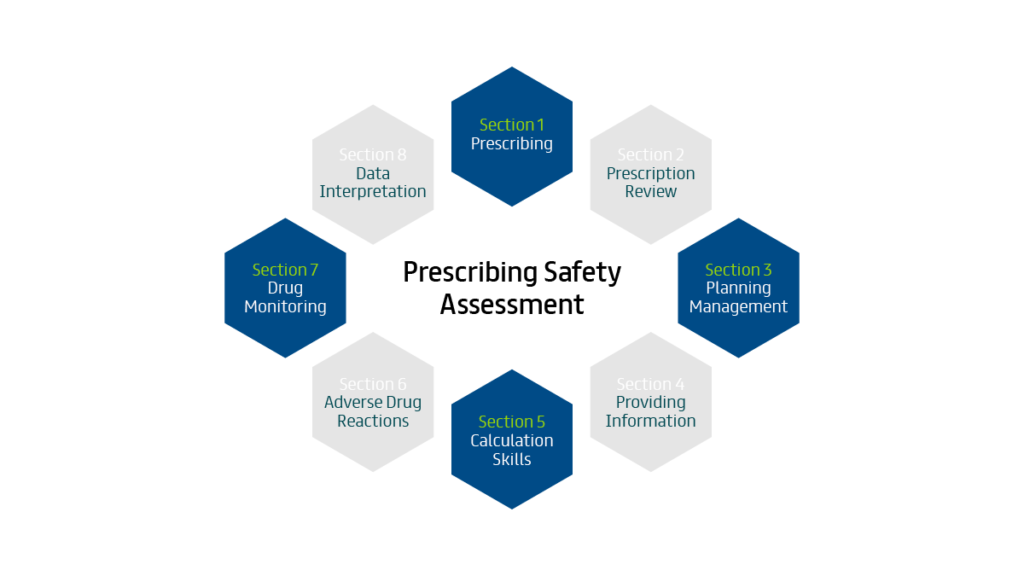PSA Exam Structure Explained: Your Blueprint for Passing
Whether you’re a medical student or a foundation doctor preparing for the upcoming Prescribing Safety Assessment (PSA), understanding the exam structure is essential for success! With the next sitting approaching on March 20th, now is the perfect time to familiarise yourself with the question types, scoring system, and best strategies to pass with confidence.
Understanding the PSA Exam Structure
The PSA exam consists of eight different question styles, each designed to assess a specific aspect of prescribing. The exam is scored out of 200 marks, with some question types awarding more points than others. Below is a breakdown of each question type, how it is scored, and tips for tackling each one effectively.

1. Prescribing (80 marks)
You will be required to prescribe the most appropriate drug, dose, frequency, and route of administration for a given clinical scenario.
Scoring: 8 questions with each question earning 10 marks.
Tip: Use the BNF (British National Formulary) to verify dosages and contraindications before finalising your prescription. You’ll have access to BNF resources including Medicines Complete BNF, BNFc and NICE BNF and BNFc (in the UK) through the exam platform.
2. Prescription Review (32 marks)
Improve patient outcomes by identifying prescribing errors and making appropriate amendments.
Scoring: 8 questions with each question earning 4 marks.
Tip: Look for common errors such as drug interactions, incorrect dosages, or contraindications.
3. Planning Management (16 marks)
Plan appropriate treatment for common clinical indications, and select the best prescribing decision for a given clinical case.
Scoring: 8 questions with each question earning 2 marks.
Tip: Consider the patient’s full history before selecting a treatment plan to avoid potential contraindications.
4. Providing Information (12 marks)
You will be asked to provide accurate drug-related information to patients and/or other healthcare professionals.
Scoring: 6 questions with each question earning 2 marks.
Tip: Always reference the BNF or national guidelines when considering drug interactions and patient counselling points.
5. Calculation Skills (16 marks)
Accurately calculate drug dosages based on weight, renal function, or other important clinical factors.
Scoring: 8 questions with each question earning 2 marks.
Tip: Double-check your calculations, especially unit conversions, to avoid potentially serious errors.
6. Adverse Drug Reactions (16 marks)
Detect, respond to and prevent potential adverse drug reactions and appropriately manage drug-related adverse effects.
Scoring: 8 questions with each question earning 2 marks.
Tip: Be familiar with common side effects of widely used medications, such as anticoagulants and antibiotics.
7. Drug Monitoring (16 marks)
Demonstrate your knowledge of how drugs work and their clinical effects, as well as your ability to monitor them appropriately to maximise safety.
Scoring: 8 questions with each question earning 2 marks.
Tip: Pay special attention to drugs requiring therapeutic monitoring, such as warfarin and lithium.
8. Data Interpretation (12 marks)
Analyse clinical data (e.g., lab results) to assess the effects of drug therapy and implement necessary adjustments.
Scoring: 6 questions with each question earning 2 marks.
Tip: Look for abnormal lab values and correlate them with possible drug toxicity or necessary dose adjustments.
Final Thoughts on Passing the PSA Exam
- Understanding the PSA exam structure is key to efficient preparation.
- Practice under timed conditions to improve speed and accuracy.
- Make the BNF your best friend—it’s an essential tool for answering questions accurately.
- Focus on high-yield areas like the prescribing section and prescription review as this is where you’ll score the most marks.
By mastering each question type and applying these strategies, you’ll be well-prepared to pass the PSA exam with confidence.
To help build your confidence, take advantage of the freely available resources designed for students and foundation doctors. The BPS Assessment portal offers a range of guidance materials to support your preparation. Make sure to explore these tools and maximise your chances of success. Good luck!



